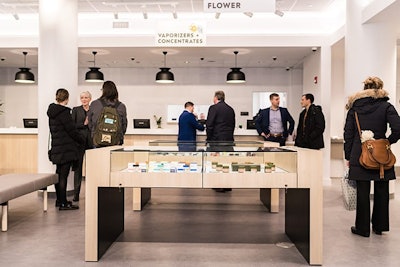
The Pennsylvania Department of Health has announced several temporary changes to the state’s medical cannabis program to help patients maintain access during the COVID-19 pandemic, and although dispensaries are not permitted to deliver product to patients under the emergency rules, the expansion of the state’s caregiver program has allowed Ethos Cannabis to deliver to certain patients.
Pennsylvania’s medical cannabis law has always allowed patients to associate themselves with a caregiver—a family member or friend who can register with the state to purchase cannabis on a patient’s behalf. Caregivers must submit to a background check, enroll in the medical cannabis program and receive an ID card, and in the past, a patient could have a maximum of five caregivers.
In response to the COVID-19 crisis, the Department of Health expanded this caregiver program to allow each patient to have an unlimited number of caregivers and for each caregiver to have an unlimited number of patients.
This change has presented a unique opportunity for Ethos Cannabis, which has registered caregivers on staff.
The dispensary is encouraging its patients to associate themselves with one of the company’s three on-staff caregivers to enable the caregivers to purchase product for patients and deliver it to their homes.
“It’s worked out very well for a number of patients … that don’t want to, for whatever reason, leave their homes during this time, which is completely understandable,” David Clapper, president of Ethos Cannabis, tells Cannabis Dispensary.
The dispensary is providing this service free of charge, and it has implemented software to optimize delivery routes and notify patients when their orders will arrive at their homes.
So far, the service has been well received by patients, and their orders have been larger than normal as they take advantage of the program, Clapper says.
Ethos Cannabis is a multistate cannabis operator that holds six total dispensary licenses, as well as a grower/processor license in Pennsylvania that will be operational by the end of the month, allowing the company to become vertically integrated in the state.
Pennsylvania’s medical cannabis program has been conservative compared to other states, Clapper says, but it has been largely accessible to patients and doctors, as well as generally welcoming to businesses.
“It’s been interesting to see how the Department of Health has reacted during this time,” he says. “They’re very patient-focused and very interested in helping the patients.”
As in other states, Pennsylvania’s stay-at-home order allows cannabis facilities to remain open as “life-sustaining” businesses, and Clapper says the Department of Health has been taking suggestions from the public on how to approach social distancing.

As it relates to the cannabis industry, the Department of Health has allowed dispensaries located in rural areas to offer curbside pickup services to their patients. Customers can remain in their vehicles, and dispensary personnel can conduct transactions outside in the facility’s parking lot.
“That worked well in the suburbs, but it wasn’t going to work in the city where our dispensary is located because the Department of Health wasn’t comfortable having the transactions occurring on a public street,” Clapper says. “For places where there are not parking lots associated with them, [curbside pickup] wasn’t possible.”
This is where the expanded caregiver program comes into play.
“It’s worked out well for us because we’re trying to limit the interactions and promote social distancing in our store for our employees and patients,” Clapper says. “It’s really allowed us to be able to provide medication to these patients without having to actually have them come into the store. That’s been a really positive thing, and again, we’ve been pleased with how the Department of Health has done that for locations where curbside delivery just isn’t able to occur.”
A Catalyst for Change
As the country—and the entire world—continues to evolve in response to the COVID-19 pandemic, Clapper and the rest of the Ethos Cannabis team are learning lessons that will carry over into their post-crisis business model.
First and foremost, the dispensary’s staff is learning how to connect with patients and provide them with information in a socially distant way, which is something Clapper would like to continue even after the coronavirus threat is behind us.
Ethos Cannabis is exploring ways to maintain a digital connection with patients, from providing information through emails and social media channels to streamlining its online ordering process. The dispensary is also taking advantage of temporary rules that allow the on-staff pharmacists to conduct patient consultations over the phone rather than in person.
“We want our patients to understand the product they’re getting [and] how they’re taking the products,” Clapper says. “I think we’re learning that we can do that in a socially distant way, online and over the phone.”
Going forward, Clapper is considering how the COVID-19 pandemic might change not only Ethos Cannabis, but also the broader retail landscape.
“Some of these online and digital interactions with our patients are where the world is going,” he says. “If someone wants to come into our dispensary and talk to us, we’re happy to do that as traditional retail. But so many of our younger patients are looking for information [and] they want to be able to do it on their own terms, and be able to quickly and easily transact. I think that’s something that will definitely carry over, and it’s something we’re talking about as a company.”
The Pennsylvania Department of Health also has much to consider about how the state’s medical cannabis program operates, Clapper adds, and he expects some of the emergency rules to become permanent to increase patient access in the future.
“I think there will be parts that continue going forward, and patients will say this is exactly what should be happening on a normal basis as a seamless, easy way for the program to operate,” he says.

























